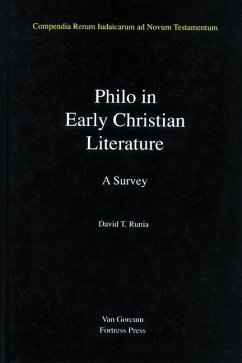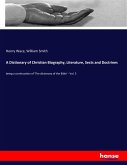It is a remarkable fact that the writings of Philo, the Jew from Alexandria, were preserved because they were taken up in the Christian tradition. But the story of how this process of reception and appropriation took place has never been systematically research. In this book the author first examines how Philo's works are related to the New Testament and the earliest Chritian writing, and then how they were used by Greek and Latin church fathers up to 400 c.e., with special attention to the contributions of Clement, Origen, Didymus, Eusebius, Gregory of Nyssa, Ambrose, and Augstine. Philo in Early Christian Literature is a valuable guide to the state of scholarly research on a subject that has thus far been investigated in a rather piecemeal fashion.
Bitte wählen Sie Ihr Anliegen aus.
Rechnungen
Retourenschein anfordern
Bestellstatus
Storno








